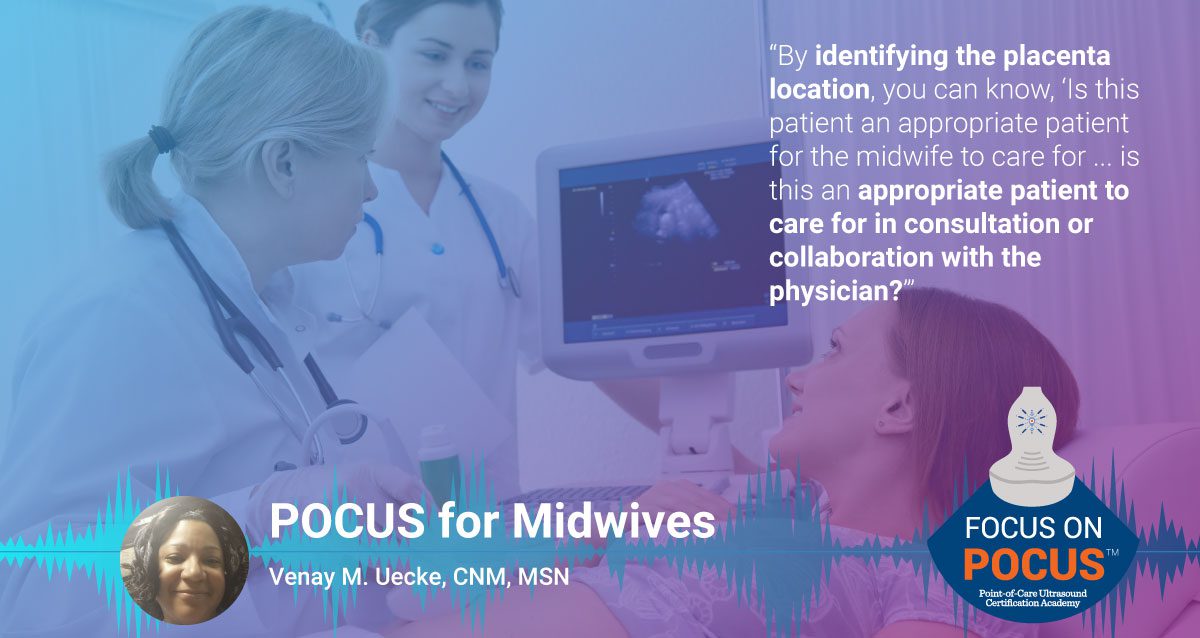12/5/18

Venay M. Uecke, CNM, MSN talks about POCUS for Midwives, her vision on how to learn POCUS, how POCUS will continue to evolve in the next 5 years, and the unique healthcare challenges in rural areas.
Looking for additional inspiration? Sign up for our POCUS Post™ newsletter to receive monthly tips and ideas.
Transcription:
James Day: Hello, and welcome to the Point of Care Ultrasound Certification Academy podcast, where we focus on POCUS. Here, we will discuss all things related to Point of Care Ultrasound, the practice, the trends, and its impact on healthcare. Our program will engage thought leaders who are defining global patient care with a stethoscope of the future.
James Day: James Day here today recording live from the Focus on POCUS studio. Today we have Venay Uecke as our guest. Venay Uecke is a member and volunteer of the American College of Nurse-Midwives. She is a member of the Ultrasound Task Force and serves as the Nominating Committee Chair and is also the Chair of the Friends of the Midwives of Color, Ethnic and Diversity Caucus. She has been a contributor to developing standards of care for POCUS and current practice evaluation since 2005.
James Day: Venay Uecke graduated from Marquette University College of Nursing with her BSN and MSN degrees. She is Board certified in nurse-midwifery through the American Midwifery Certification Board, the AMCB. She focuses her current ultrasonography on practice in rural and under served communities. Her current and previous experiences reflect involvement in graduate nurse-midwifery education, and as a hands-on clinical preceptor which includes point of care ultrasonography.
James Day: She currently supervises an amazing group of midwives, and works in a remote rural location, and provides POCUS to an underserved deserving population in the Four Corners area of New Mexico. Very impressive, Venay.
Venay Uecke: Oh, thank you.
James Day: Wow, there’s so much to talk about here, and such good work you guys are doing, a lot in the press about midwifery and midwives that I’ve seen and been reading. So what resources are available to develop a relevant Point of Care Ultrasound clinical skills to you?
Venay Uecke: Well, you know right now we have through the ARDMS we have the midwifery sonography certificate. There’s several courses that are available. There’s some exams and programs. There’s some in-person programs, hands-on training that are available for midwives to be able to practice and to develop and focus their skills on POCUS.
James Day: Right, so with that, how does one move forward with securing your Point of Care Ultrasound credentials as it applies to midwifery?
Venay Uecke: Well, there’s specific recommendations and eligibility requirements, and they’re comprised of clinical and educational components. They were developed in conjunction with the ARDMS staff, and then there was a development task force that looked specifically at developing these types of skills. There’s a position statement that can be referenced on www.midwife.org, where you can review the updated eligibility requirements, the certification process. There’s specific testing locations.
Venay Uecke: The certification allows you to fully bill. It’s an interactive test. There are some comprehensive reviews that are available, and in addition, you can get continuing education units. It’s just so much more than just finding the correct answer to a question. It really is a synthesis of knowledge and hands-on skills.
James Day: I think it was the in LA Times, I saw an article about one of the leading causes of global maternal death is a hemorrhage usually caused by a placenta block in the birth canal. I think this is a very easy ultrasound diagnosis as well as other causes of maternal hemorrhages. Can you talk about that a little bit?
Venay Uecke: There’s definitely a place for ultrasound in reducing mortality rates. You can take it from the first trimester where you can evaluate and examine to rule out ectopic pregnancies, gestational trophoblastic diseases, and then in the second trimester it can help you to determine where the placental location is, and if the placenta is blocking the baby and the placenta detaches first, then that’s very dangerous for the pregnancy. We look at the placenta and the placental location to determine where is it in relation to the opening or the cervix, and if it’s covering it’s called placenta previa.
Venay Uecke: There’s also a low lying placenta that’s near to the opening, but not covering and not opening it up. Those are a little bit safer to deliver vaginally. You want to definitely make sure that you can determine where the placental site is so that the patient can deliver in the most appropriate location.
Venay Uecke: So if you miss, I mean that would be something that would really be missed, and that would be a suboptimal standard of care. So one says that by identifying the placental location, you can know is this patient an appropriate patient for the midwife to care for, and is this an appropriate patient to care for in consultation or collaboration with a physician?
Venay Uecke: And then you can look at the location where the patient should be delivered, and make sure that at the time of delivery that you develop a proactive plan like a team approach to make sure that you have all the right people onboard, that you have blood products available and for everybody to know what their role and function is to prepare for this delivery in this appropriate location.
James Day: You know, also something in the other national press, there’s a Washington Post article in the Health & Science section that there’s a shocking number of United States women that still die from childbirth, and I think a couple of other states are doing something about it. They’re reversing this trend. California comes to mind. Do you see that more and more in your practice?
Venay Uecke: Yeah. As incidents of Cesarean section increase, so does the incidents of abnormal placentation. And so it’s really important for awareness, to know why are women affected and what populations are affected. Midwifery care has been shown to be favorable in helping to assist with favorable outcomes because the type of care that’s provided, the appropriate use of the technology, and the skill set that midwives have that work in specific types and locations like high-risk practices, and in collaboration with the physicians.
James Day: You know, I really find it fascinating, the Four Corners area of New Mexico. Can you tell us about your work in Native American reservations?
Venay Uecke: Well, right now I work for the Indian Health Services, and I’ve been here for about five years. We provide primary care. We have a critical access hospital. We’re not located near major metropolitan area. Albuquerque is one of the closest major cities and that’s still a three-hour drive. So, you can imagine the type of-
James Day: Wow.
Venay Uecke: You know, access that we provide that’s very critical from the lack of access to other types of facilities. And so things that we don’t deliver because we look to see what services are available here. What can be rapidly turn around? Is this patient safe anesthesia-wise? Is this patient safe from her placental location? Has she had a previous C-section?
Venay Uecke: One thing we do do, we do trial of labors or vaginal deliveries after Cesarean sections for the appropriate candidates. And we do transfer out some patients that we feel would be better served at a different location, and that’s a hard decision to have to make when you have this established bond, and you’ve been caring for not just the Mom but you care for the daughter, you care for the grandmother. So there’s a lot of family caregiving that’s involved being in a rural location.
James Day: Yes, and it’s shameful the rates of maternal death are as high as they are in America, and it’s not really known as a resource-limited environment. But you speak to that, and I’ve read a study about midwifery programs in Nigeria. So what do you see midwifery POCUS practice going five years from now?
Venay Uecke: I think it’s going to continue to develop. The skill sets going to need to evolve. It’s going to be secured with the midwives that are currently doing it, and it’s going to be something that will be picked up by the next generation, and it will be something where knowledge is shared. It will be used to enhance outcomes.
James Day: All right. Venay Uecke, nurse midwife, thank you for taking the time to be here on today’s show. You know, I appreciate the audience for listening, and don’t forget for even more POCUS talk, you can follow us on Twitter at POCUS Academy and on Facebook at POCUS CERT Academy.
James Day: Venay, it was an honor to have you on our podcast today.
Venay Uecke: It was an honor to be here. Thank you so much for listening.
James Day: We hope you enjoyed today’s podcast Focus on POCUS. Be sure to tune in with us next week for more interviews with thought leaders that are on the forefront of global Point of Care Ultrasound.
James Day: The thoughts and opinions expressed in this podcast are the views and opinions of the guests, and not those of the Inteleos. This podcast is for information purposes only.
Participate in Setting Global POCUS Practices
Help us define the future! We need your your insights to help us scientifically develop a list of the top 25 point-of-care ultrasound protocols and procedures used worldwide. We would so appreciate it if you would participate in our POCUS25 Survey today!





















